The Czech president’s bromance with CEFC has most saliently illustrated the intensity of CCP influence in the country’s high politics, teeming with links to the Party’s International Liaison Department (ILD). However, in the shadow of this high drama, the United Front (UF) system, famous for its Antipodean prowess, is also active in the Czech Republic, cultivating lower-level decision makers below the media radar. There are many foot soldiers in this more pedestrian side show, but one in particular stands out. His name is Wu. James Wu.
Czech president Miloš Zeman famously appointed CEFC chairman Ye Jianming 叶简明 as his ‘advisor’. Ostensibly a private businessman, Ye has been linked to CAIFC, a ‘friendly contact’ organization under the Central Military Commission’s Liaison Department. CEFC has since fallen out of favour, in what some interpret as a move to prevent international bribery allegations involving the company from reaching the Party itself (‘forsaking a soldier to save the general’ (舍率保帅) was the idiom chosen by Chinese writer Yu Jie 余杰). CEFC’s Czech creditors and CITIC, involved in its nationalization, are now fighting over its local assets. (Oblivious to the debacle, Zeman still officially keeps ‘friendly contact’ Ye at his advisory post, without clarifying what advice can possibly be sent from an undisclosed location where the Chairman is now held for internal Party investigation.) Apart from Zeman’s peculiar choice of advisors, the Party’s International Liaison Department (ILD) can also boast of friendly exchanges with the Czech political élite.
The ILD’s friendly Czech liaising with political elites have left the United Front with smaller fish to fry, but its role within the CCP’s foreign policy shouldn’t be underestimated. Discreet contacts with local organizations attempt to make ties and deals faits accomplis before the media notices, thus preempting what Beijing’s propaganda officials call the ‘China threat theory’ (中国威胁论). In decentralized administrations and free media environments, such local work can provide better results than the kind of high-level engagement seen in Cambodia, Chad or at Prague Castle. Top level politicians get voted out of power; grassroots links often tend to prove more durable.
A discussion of UF tactics in the Czech Republic can hardly avoid acknowledging the common Stalinist heritage. After some reluctance, the CCP came to like the UF policy imposed on it (cogently expounded by Stalin in 1927). It greatly expanded it, turning it into a tool to co-opt not just the political parties typical of the Leninist concept, but also business groups, religions and secret societies. Meanwhile, Czechoslovakia also got its ‘national front’ as a gift from Uncle Joe, as an increasingly Communist-led coalition after the war, destined to eventually demote its non-Communist partners to an ancillary role. Despite Mao’s claims that the CCP had become independent of the Comintern by the mid-’30s, as late as 1947 he wrote to Stalin about his wish to “study the work of the national front” in Eastern Europe. In the Czech Republic and elsewhere in the region, Beijing’s UF work just brings back home a tactic that should sound vaguely familiar. The Xiist ‘Community of Common Destiny’ (命运共同体) Czech politicians recently signed up for at the ILD’s invitation could perhaps be better called a ‘Community of a resurgent Comintern’.
Making friends in Olomouc
Olomouc, a city of 100 000, is mainly known for its historical landmarks. Less well-known is the flourishing of a provincial version of the Czech-China druzhba that brings together local Czech politicians and Chinese businesspeople with colorful connections. In cooperation with the independent media outlet Hlídací pes, Sinopsis has mapped a web of local connections all going back to one man, James Wu (Wu Ruizhen 吴瑞珍). Strange things happen. Town squares in Prague get blocked from protestors. Provincial “embassies” of Czech regions open in China.

The first time Wu, originally from Fujian province, appeared in Czech media was in 2008, when he lost his goods to a fire at an Asian market in Prague. His name resurfaced again in 2016, when one of his “trade” organizations booked prominent public spaces during Xi Jinping’s visit in Prague, thus effectively blocking protesters from meeting the general secretary face to face. Wu founded the Czech-Chinese Trade Association in 2009, but left it two years later and established another organization, the China-Europe Cooperation and Development Center.
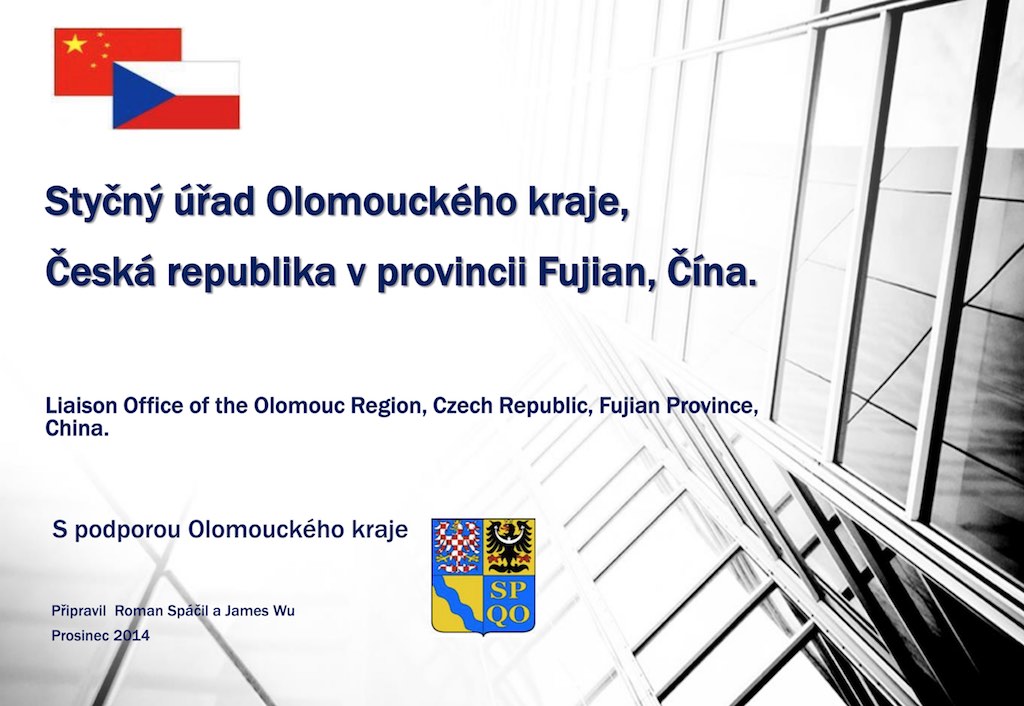
The Office was run at the Czech end by an Olomouc businessman, Roman Spáčil. He was introduced to Wu by a senator for SPO, a party based on personal loyalty to President Zeman. He was also behind the establishment of an Olomouc “embassy” in Fujian, an institution with the stated primary goal of strengthening the cultural and trade relations between the two provinces. All with the financial and political support of the local government.
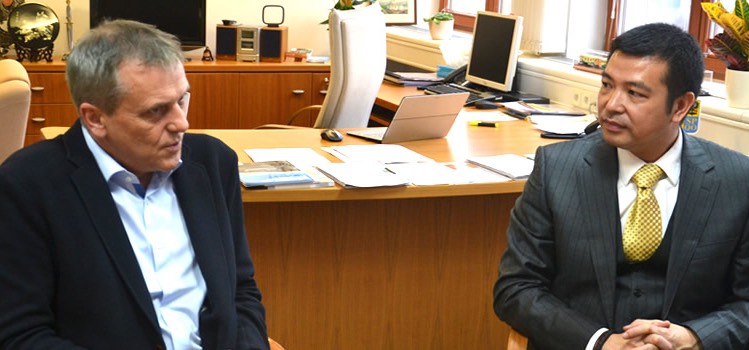
Wu and Spáčil had big plans for the institution, but for no clear reason (all parties give different explanations) nothing came out of it and today there is only scarce information about what the Center is actually working on—if anything. The local government is unable to name any benefits of the above mentioned “embassy” or its current activities, three years after its establishment. According to Spáčil, it is Wu who is still responsible for the institution, now using the name Economic and Trade Coordination Centre of Olomouc Region. In his own words: “It is all about making contacts. Also, there is no concrete project we could cooperate on.” At the same time, Wu claims to be the representative of Olomouc government in Fujian province in his own bio.
Good relations are the key
Wu’s main quality seems to be his ability to make contacts, as his former partner confirms:
“James has very good, even excellent long-term relations with top-level Fujian officials. I have started working on my other projects and we parted our ways,” says Spáčil. He also adds that Wu demanded as much access to Czech politicians as possible and to get pictures taken with them, which Spáčil rejected.
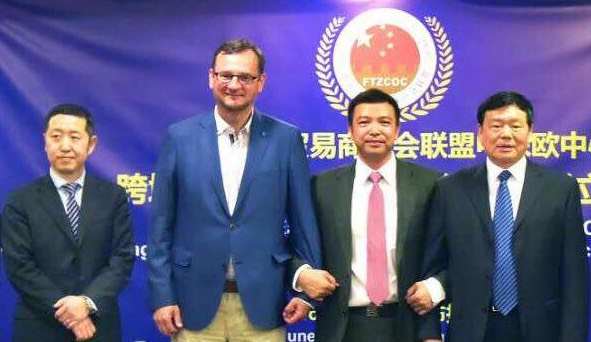
Excellent relations with top-level Fujian officials are also mentioned in documents prepared for the founding of the “embassy”, quoted by Hlídací pes.
Wu’s bio on the website of the European Confederation of Fujian Associations (欧洲福建侨团联合总会) can shed light on his prominence in United Front activities. Out of more than twenty members of the institution, Wu boasts the longest CV (most of the others only have photos next to their names). Only Dong An 董安, the chairman of the German Fujian Association, comes close.
Navigating the diaspora
James Wu graduated from Jimei University (集美大学) in Xiamen with a degree in maritime navigation. After school he worked at a Hong Kong logistics company, Orient Overseas Container Lines (OOCL). In 1997 he moved to Prague and entered the luxury furniture and shoe businesses. Since 2006, he has been “participating in events” organized by the the Overseas Chinese Affairs Office of the State Council (OCAO, known by its abridged Chinese name Qiaoban 侨办), first at its Shanghai branch and later at the national and other regional levels. The Qiaoban, which, like many state organs, exists at the national, province and municipality levels, coordinates Overseas Chinese affairs (Qiaowu 侨务) across the PRC government.
Qiaowu is a major domain of CCP policy, dealing both with PRC citizens living abroad and foreign nationals of Chinese ancestry. James To, the author of the most complete study of the subject, describes Qiaowu as “a massive operation involving incorporation and co-optation of the [Overseas Chinese] at every level of society, and managing their behaviour and perceptions through incentive or disincentive to suit the situation and structural circumstances that the CCP desires”. Qiaowu is also a major aspect of United Front work: the United Front Work Department (UFWD) has always had a central role in guiding diaspora policy, now undergoing further institutional consolidation. Under Xi’s ongoing restructuring of the Party-state, the Qiaoban will cease to exist as a government organ to be absorbed into the UFWD, a Party department.
United Front tour on the way to the Expo
In 2010, Wu led a delegation of Czech businesspeople to the Shanghai Expo. “Along the way” they visited several local offices of the Qiaoban, the UFWD and the All-China Federation of Industry and Commerce in Shanghai, Jiangsu, Zhejiang and Fujian. Everywhere they “established friendly cooperation relations”.
The UF system’s official recognition of Wu’s role came soon afterwards, through the Chinese People’s Political Consultative Conference (CPPCC). The CPPCC, a major UF body with committees at multiple levels of administration, has an “advisory” role to the government, and mostly consists of representatives of extra-Party groups vetted by the UFWD. Between 2012 and 2016, Wu was a member of the city-level committee of the CPPCC in Ningde 宁德, a municipality of 3 million in northern Fujian that includes his hometown.
His CPPCC role did not, however, stop at the city level. In 2013, he helped organize a visit to the Czech Republic by Zhang Changping 张昌平, then chairman of the Fujian province CPPCC, to Wu’s bio claims he himself attended the Fujian CPPCC three times as a non-voting delegate, an important recognition. In an endorsement of his work in the Czech Republic, last year Yang Gensheng 杨根生, a vice chairman of the Fujian CPPCC, and the PRC ambassador attended the opening of the Czech-Fujian Association (捷克福建同乡会) presided by Wu.
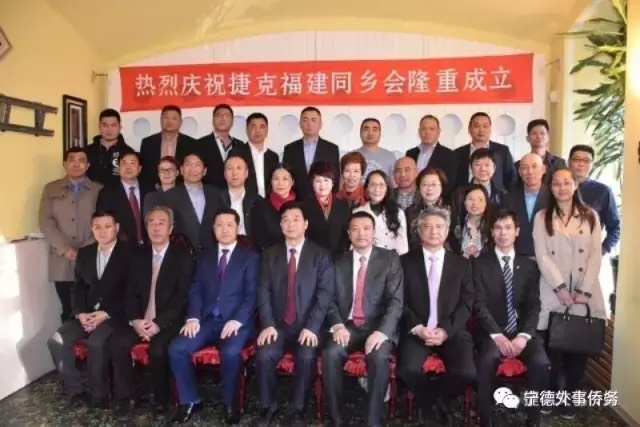
Wu himself says that he is now mainly focused on projects in Fujian through the China-Europe Cooperation and Development Center, but at the same time willing to help with culture exchange and other activities beneficial to Czech-Chinese friendship.
An accomplished networker
Wu keeps getting awards, praise, invitations and appointments from the Chinese authorities. Last January, his bio claims, he received an award for extraordinary individual contribution at the Belt and Road International Talents Award Ceremony from the hands of former vice-ministers of commerce and foreign affairs. The same month, he was invited to a Chinese New Year Celebration for senior retired officials and PLA officers, co-organized by popular spirit brand Kweichou Moutai.
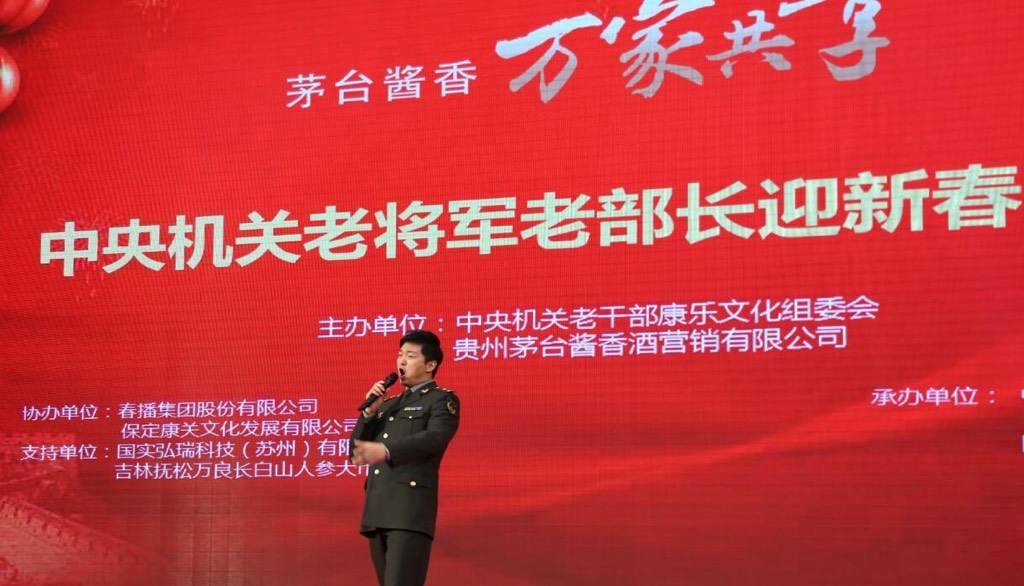
Months ago, Wu appeared to jump across the division of labour among Sino-Czech influencers, rising from his United Front world to approach an orbit around CEFC. According to his bio, in February he became vice-chairman of the World Fujian Youth Organization. Another prominent Fujianese active in the Czech Republic, Chan Chauto (Chen Qiutu 陈秋途) was appointed chairman of the body. Chan was president of CEFC, a corporation plagued by corruption scandals at the UN and in Africa, until apparently falling from CCP’s grace in recent months.
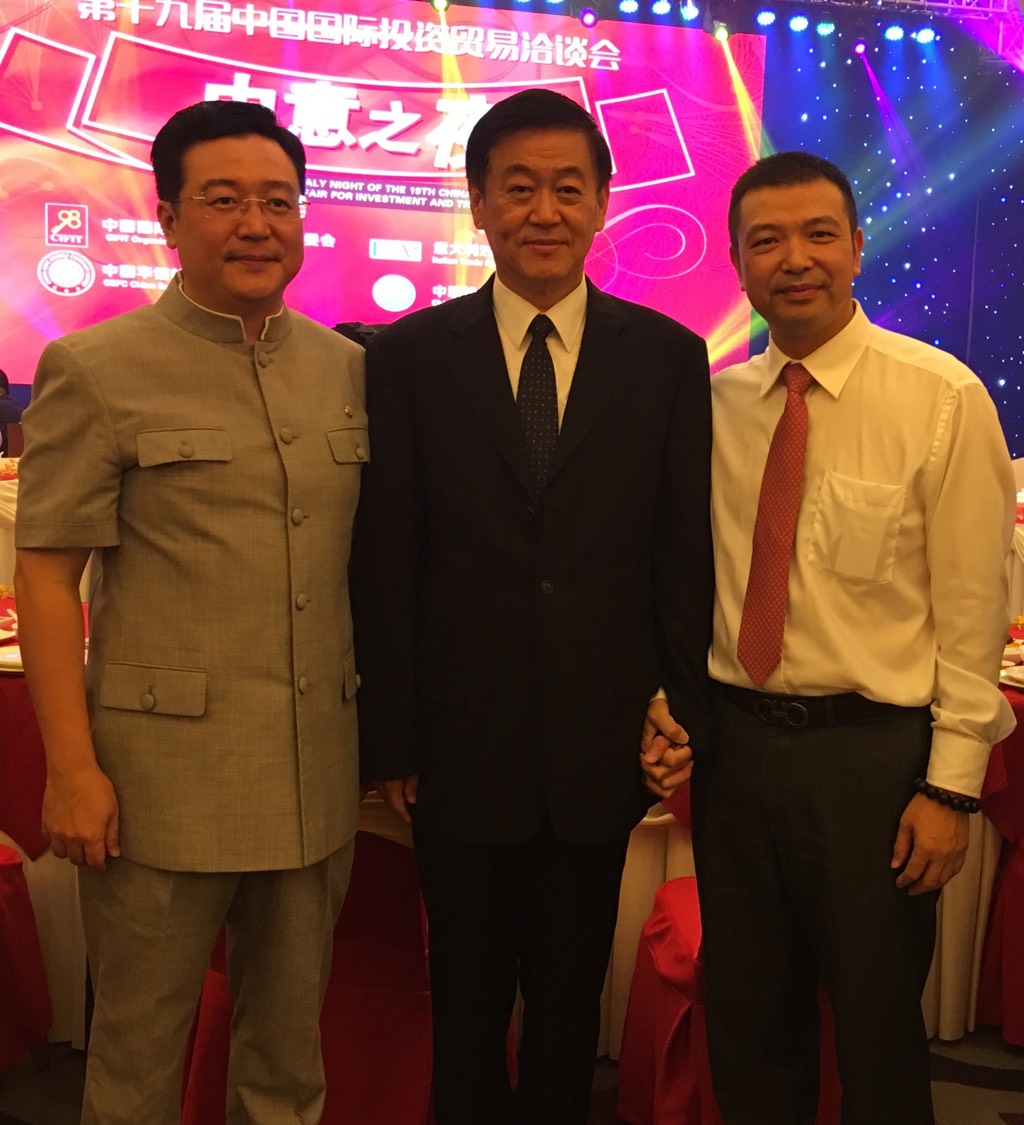
Before Ye Jianming’s fall, Wu claimed plans to cooperate with CEFC and praised its “grand” projects. He was looking for “the right time and the right project”; they just never came. Now that the tide has turned against CEFC, he might choose his words more carefully. As the CEFC saga has taught us, the CCP’s highest awards are no guarantee of permanent favour. Chairman Ye, disappeared since last winter, could surely confirm that. If CEFC’s flamboyance had a role in its undoing, United Frontlings like James Wu might want to stick to their more discreet approach.
Researched, written and published in cooperation with Jichang Lulu.
